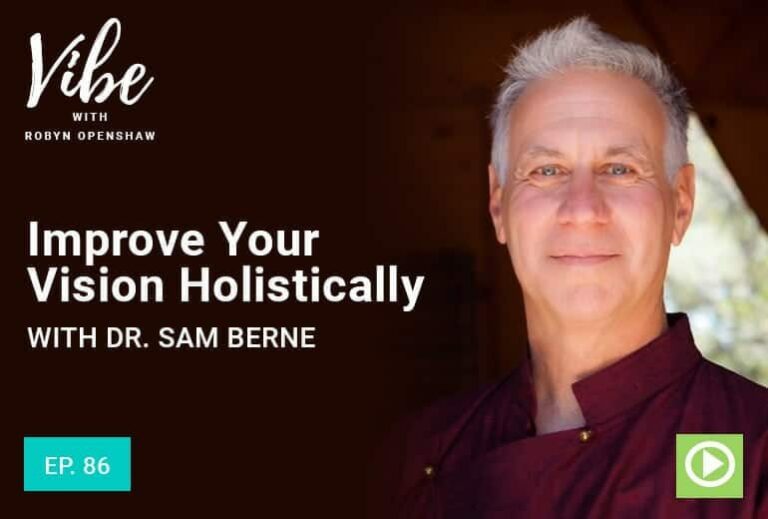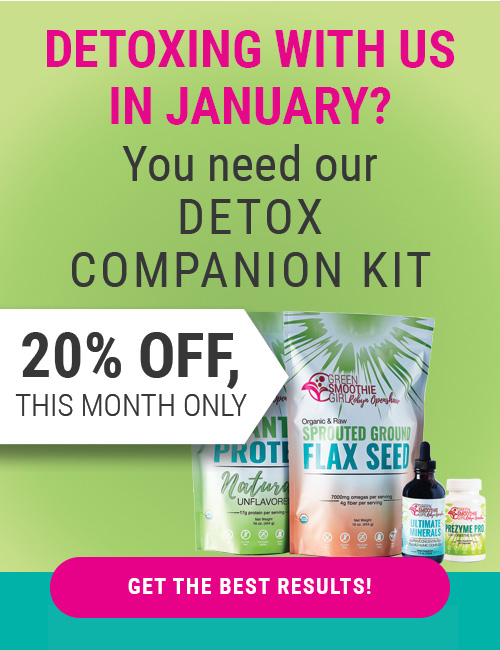Ep.86: Improve Your Vision Holistically with Dr. Sam Berne

Podcast: Play in new window
Did you know your eyes can heal just like the rest of the body? Dr. Sam Berne comes on our show to teach us how we can improve our vision holistically. He’s been in private practice as a holistic Optometrist in New Mexico for over 25 years and he’s really interested in helping patients improve their overall wellness through holistic methods. He understands how the eyes are connected to our overall health.
LINKS:
Shop with Dr. Berne: Click Here
TRANSCRIPT:
Robyn: Hey everyone, it’s Robyn Openshaw. Welcome back to VIBE. We have a really interesting subject today. I was losing my eyesight in my early twenties, and that’s what interested me in reaching out to Dr Sam Berne.
I was losing my sight in my early twenties. I was wearing glasses, and then I completely changed my diet. You already know my story probably – you know that I changed to a whole foods, mostly plant-based diet many many years ago, decades ago, resolved 21 different diagnoses that I had, lost 70 pounds, and completely turned my whole health around. I don’t usually list out all the 21 different diseases I was diagnosed with, but one of them was that I was losing my eyesight.
And now at the age of 51, I don’t have to wear glasses. I haven’t had to wear glasses in many, many years. So I’ve invited Dr Sam Berne to come on the show. The reason his work fascinates me is you never really hear about a holistic optometrist, but it makes perfect sense that our eyes are connected to the rest of our body. That is where his work has taken him, because he’s been in private practice in New Mexico for over 25 years and he works with patients to improve their vision. But he’s really interested in helping patients improve their overall wellness through holistic methods because he understands the way the eyes are connected to our entire health.
He’s done a lot of postdoctoral work at the Gesell Institute in collaboration with Yale University. He’s done a lot of innovative work with children, and so I’m very excited to welcome Dr. Sam Berne to the show.
Dr. Berne: Hey Robyn. Thanks for having me.
Robyn: Well, delighted to have you here. I know you’ve done articles for MindBodyGreen and a bunch of places on the Internet. I heard a show that you did and I was like, “Gosh, I really want to ask deeper questions here.” So how did you go from being sort of this standard of care optometrist, who does the testing and gives people glasses and contacts, to getting so much deeper into the holistic approach?
Dr. Berne: Well, it was through my own process, and it started way before optometry school. When I was about eight years old I was diagnosed with a learning disability, and my mom took me everywhere. We ended up in an eye doctor’s office, and I got a pair of nearsighted glasses that didn’t help my learning. I memorize, that’s how I got through school, but my eyes got progressively worse.
When I graduated optometry school, I met a holistic eye doctor and I went to him for about six months in a process called vision therapy, which is a physical eye therapy. And two things happened. My nearsightedness completely dissolved. And the second thing is he diagnosed me with a condition called convergence insufficiency, which means my two eyes didn’t work together. My left eye wandered out, and I had double vision.
So through this vision therapy I was able to repair [the convergence insufficiency], and my learning and reading skyrocketed. I lost my nearsightedness, and my learning disability went away. So, I said, “I want to go into this more holistic approach,” and that’s my passion and that’s what I’ve been doing ever since.
Robyn: So you didn’t come on this late in your practice, you have been interested in this from the very beginning. You’ve been looking for everywhere you can learn about the connection between our eye health and our overall health then?
Dr. Berne: Exactly. You know, when I opened my practice, I had a hard time getting patients. I was practicing in Philadelphia, and I went to one of the local hospitals and I worked with patients who had traumatic brain injury. These people had double vision, memory issues, balance issues. So applying this physical eye therapy to them, they got better. And so I ended up getting about four contracts in different hospitals and that’s how I started my practice.
And then I began counseling patients who had cataracts and macular degeneration to just eat better. I didn’t know that much at the time. I said: “Just eat better, eat more plant-based, more natural foods.” And they’d come back and they’d say: “My cataracts are going away, my macular degeneration is getting better.” So I was onto something, and I began studying craniosacral therapy, naturopathic medicine, acupuncture, and just evolved into a pretty big toolbox because I realized that the eyes reflect our metabolic and systemic health.
Robyn: Okay. So I mentioned my story when I was in my, I want to say late thirties coming up on 40, I only used glasses at that point for driving. And I just kept noticing my glasses weren’t really working.
So I went into the optometrist and he did the tests on my eyes and he said: “Well, I have some strange news for you.” He said: “If I could just keep your glasses, I’d like to give them away because you have 20/20 vision in one eye and 20/15 in the other eye.” And he said: “I don’t know what you’re doing exactly, but keep doing it because you don’t need glasses. That’s why your glasses aren’t working, is that your vision is perfect.”
And this is after many years of eating lots of green smoothies, which is our website is greensmoothiegirl.com, and now obviously I was walking the talk or I wouldn’t be so passionate to go out and put up this website and teach it to others.
I do juicing off and on. A lot more now in the last five or six years since I went on a big research tour studying what functional medicine practitioners or biological medicine practitioners all over the world are doing to treat cancer. And I found that pretty much all of them are having people drink a lot of vegetable juices – carrot juice, throw some beets in there, lots of greens, lots of alkaline vegetables. So I’ve done a lot of that the last six or seven years, and I was really influenced by that.
But can you talk about what you think happened? Because when I asked the optometrists how often he sees that and he says: “’I’ve seen it once or twice in my career.” It sounds to me like you’re seeing it a lot, and maybe you’re guiding it.
Dr. Berne: Well, you know, since it happened to me, I can recognize it out there. And what I would say is that, you know, the eyes need a lot of oxygenation and hydration. The retina has a sea of micro capillaries, and the eye itself has one of the highest metabolic needs of the body. And so when we start developing eye problems, any kind of eye problem, there’s an issue with free radical damage, metabolic waste – the mitochondria are not producing enough ATP.
So just give your eyes and body more antioxidants, you know: the green leafy vegetables, reduce your stress, get rid of toxicity. Your eyes reflect systemic health. I mean we can do retinal scans, and pick up on things like Alzheimer’s and Diabetes. So the eyes, kind of, are what we see into the future in terms of our health, and it makes total sense to me.
Yeah, I guide the process. I support it. People are seeking me out because I’m one in a million. We are trained in a medical model, a disease-based care where we’re looking for disease. And then we use pharmaceuticals or surgery, but I’m saying, “Hey, there’s all these natural methods; we can heal other parts of the body. Why not the eyes?”
Robyn: I want to talk about some of the common issues that we see when people’s eyes start to degenerate and how most of medicine, like you said, all but the one in a million like you, just accept it and treat that degenerative disorder. So I want to talk about the specific things you can do that aren’t food, but first of all, I’m curious…What kind of diet do you eat? Like you said, you eat the rainbow, you eat good fats.
Dr. Berne: You and I probably share a lot. I mean, I do a lot of smoothies. I have a Vitamix and so I’m doing a lot. We have a greenhouse, so we grow our own food. So a lot of Greens. I like Tumeric root, Ginger root. I like to use herbs and spices and just a lot of different combinations of plant-based [foods]. And that’s how I start my day. So mostly just plant-based, organic, very clean diet. And a few supplements to help me, but, yeah, I definitely walk my talk. I use food as a healing tool; food is healing and so that’s a really big part of it.
Robyn: I’m glad to hear that. Turmeric and Ginger root are in my green smoothie one, or both of those, almost every day. So do you and your wife make fermented foods? And if so, what? Which ones do you make?
Dr. Berne: Well, I was making Kombucha on my own for a long time. So I had fun with that. There’s actually a place here in Santa Fe where I live that makes really fresh Kimchi and Sauerkraut. I don’t have time to make those, but they are part of our diet. I actually use a salad dressing, that I make, using the Sauerkraut and Kimchi. So I’m a big believer in pre-probiotic fiber and fermented foods as part of healing the microbiome. It’s an essential piece.
Robyn: What a great idea. I’m going to take my homemade sauerkraut. I have literally 13-year-old raw sauerkraut that I grew myself organically in my garden. And then I made like 50 jars of it, but I just forget to put on my plate. I’m going to make salad dressing out of it. That’s a brilliant idea.
Dr. Berne: It’s great stuff.
Robyn: Do you know my friend Dr. Robyn Benson in Santa Fe?
Dr. Berne: Very well. Yes. Robyn and I have collaborated together. She’s an awesome person.
Robyn: Oh, that is awesome. Well tell Robyn Hi from Robyn.
So talk a little bit about the difference between conventional eyecare and holistic eye care. Because you’ve alluded to the fact that you’re literally one in a million. I’ve never met another holistic optometrist. So talk about what keeps them stuck in, you know, the “sick care.” It’s basically the eye version of sick care, right? What is driving that? Why is there nobody else out there like you?
Dr. Berne: That’s a good question. I think it’s partly the educational curriculum because, what’s happening is, optometry is merging and blending with ophthalmology. So the surgical model, the pharmaceutical model, as always, is kind of driving the bus, and there isn’t anything talked about, natural healing or anything, outside the eyes being a mechanical system.
But there are some principles that I teach from that include, you can improve your vision at any age. Vision problems are related to chronic disease and inflammatory disease, so if you heal the chronic inflammatory disease in the body, the eyes get better. Trauma, stress and toxicity affect the eyes.
If we look at Chinese medicine, the liver rules the eyes in Chinese medicine. Even dental care. If you’ve got amalgams, I’ve seen a correlation between dental amalgams and floaters in the eyes. So all of these different conditions can be helped because when we work with the eyes, we’re working with an extension of the brain.
Research says that in the first trimester, the eyes actually grow out from the brain. So when we work with any tissue in the eye, we’re working with the brain. Therefore, the eyes qualify for something we call neuroplasticity, and in my MindBodyGreen Blog that you referred to, I talk about ocular regeneration and something called BDNF: Brain Derived Neurotrophic Factor. And, actually, if you increase BDNF, it can improve your eyes.
So you know, there’s so many connections going on between our eyes and our body. We could spend the hour just talking about that.
Robyn: So if you’re getting people to do some interventions that are decreasing inflammation, because what they’re presenting you with is an eye problem, and if they change their diet, take the supplements you suggest, do the interventions you suggest, they’re probably gonna see decreasing inflammation in a variety of ways systemically. Is that fair?
Dr. Berne: Totally. That’s why when you described what I’m doing, I basically call myself a whole health optometrist. I’m a Naturopath that works as an Optometrist, except I’m an Optometrist. And, you know, we can’t separate out our eyes from our body. If you’ve got a thyroid problem, that’s going to affect dry eyes syndrome, or adrenal burnout, that’s going to affect dry eyes too, and you know, blepharitis and possibly glaucoma. So we could trace each eye disease and come up with a systemic reason why our eyes let us down.
Robyn: How about the light that comes into our eyes? I feel like we all want sunglasses on. I play tennis competitively and I wear [prescription sunglasses]. I should say that, even though my eyes were perfect at age 40, at about age 48 I noticed that I couldn’t always make out the features on my opponent’s face across the tennis court from me, especially if I was playing singles and we’re both playing back.
So I did go back, and I now have prescription glasses and sunglasses that I wear for just one thing. Like I literally don’t even need them for driving. My eyes aren’t that bad to need them for driving. But when I play tennis I do because I can see the ball coming from far away really clearly if I wear them.
But I have read that we want the light coming into our eyes. Can you talk about reasons why we might, and why we don’t want to maybe necessarily wear our glasses at all times. Even if we have a prescription. Is that a thing?
Dr. Berne: So light is a food, and it affects our endocrine system, our nervous system, and our vision. And there are pathways in the eyes that send the light to different parts of the brain. Some of them are non visual pathways that affect our hypothalamus, our pineal and pituitary gland. So light is very necessary for our overall health and wellness. Light can affect our pH levels. It can improve cellular metabolism. It gets rid of toxicities.
Many years ago I began using color therapy on the eyes to open up the peripheral vision and you know, the mainstream says you have to be afraid of the light and that you have to block the light all the time. And I would say, for UVA and UVB, you want to protect yourself from that. But you also want to get at least 30 minutes of natural sunlight every day before 10:00 AM and after 5:00 PM. We are heliotropic beings. We go towards the light.
And so this idea that we’re blocking our selves, because we’re made of photons, really, made of light, so it becomes an autoimmune disease. The more light we take in, the more light we radiate out.
So I talk a lot about the importance of light as an important nutrient. Depression is another thing – if we don’t get enough light in the winter time, it affects our mood. So light is an essential nutrient and I think we all need it.
Robyn: What about the correction issues? Even if we wear corrective lenses of some kind, whether it’s glasses or contacts, should we be taking them off as much as possible to strengthen our eyes or is that false doctrines I’ve heard over the years?
Dr. Berne: Okay, so that’s a great question. So you wear the optical system you need to see clearly and feel safe. But in non-demanding and non-threatening situations, ask your eye doctor for a reduced prescription, and start wearing it and you’ll notice your nervous system is more relaxed. And part of it is being able to interact with your attitude about blur.
This is one of the techniques I use in my office, where we actually take people away from their comfort zone and put them into the blur. And we ask them to embrace the blur. And that’s very scary for us because blur means “it’s bad, I’m getting it wrong, I could get injured”, and so by going into your blur in a non-demanding situation with opposite glasses you can actually reset your eyes so that your eyes see 20/20.
It’s a very powerful technique. And, you know, you can wear different glasses at different times or contacts to improve your vision; your eyes just don’t have to get worse.
Robyn: Okay. And I want to mention, for anybody who heard my story where I wore glasses at 20 and at 40 had perfect vision, I think that’s the other component. The only two things I can think of are that I really changed my diet, and quit eating the crap diet that I was eating when I was 20. And I didn’t wear my glasses unless I had to. And so, you know, maybe it’s like flexing your muscles a little bit.
Dr. Berne: Yeah, because when you wear a prescription based on the 20/ 20 eye chart, it’s a static measurement. It freezes your eyes in one position.
You know when you go to the eye doctor, and you’re sitting in the chair, and it’s dark, and she says: “Which is clear, one or two, one or two?” And you don’t know, so you guess number one. And let’s say you’re having a bad day or you’re stressed and you get this prescription and it makes you nauseous. So you go back to the doctor and he says: “Don’t worry, you’ll get used to it”.
No! You don’t want to get used to looking through a filtering system that makes you nauseous. So any prescription that’s prescribed at 20/20 is going to weaken your vision. That’s why I recommend reduced prescriptions and opposite prescriptions. We even work with an eyepatch and we dialogue with the eyes.
There’s a psycho-emotional component to our eyes. So we want to blame faulty vision on the eyeball but it’s the programming behind the eyes, it’s what our mind tells our eyes, that causes the physical changes.
Robyn: I kind of want to blame our eye problems on all the screens we stare at all day, especially these small ones. I feel like my vision gets blurry when I spend more than usual time looking at my phone, especially if I’m watching videos on it, or something like that, while I work out. I try to just listen to podcasts and audiobooks and I text a lot, oh my gosh, I text so much. What’s this doing to our kids’ vision? What’s this doing to our vision?
Dr. Berne: Well, it’s really deteriorating it. You know with the digital device, there’s a couple things. First of all, our eyes are locked into one focus for a long period of time. And there’s the EMF issue, and then there’s the blue light issue. And so what I recommend is the 20- 20- 20 rule. Every 20 minutes take a 20 second break and look out at 20 feet.
I also recommend moisturizing your eyes with eye drops. I like to use MSM eye drops. Most of the eye drops that are in the pharmacy dry your eyes more. And you gotta make sure you’re getting enough fats and oils. There’s also eye exercises on my website, free exercises to create relaxation in your eye muscles. We have to take better care of our eyes because the digital devices are wreaking havoc.
Robyn: I’m going to ask you at the end where people can find you, but since you just said you have some exercises on your site, while people are thinking about it, what’s your website? And tell us a little bit more about these strengthening exercises.
Dr. Berne: One of my missions is to share this information, so I’ve created what I call a “clarity program,” a 90-day eye exercise clarity program. If you go to my website, http://www.drsamberne.com/ and you type in your eye condition, you will get a 90-day eye exercise program with videos. People are just loving this because it’s giving them content and information that’s helping them. There’s lots of resources out there I’m providing.
Robyn: Okay. And it’s http://www.drsamberne.com/ if you’re wanting to go check it out.
So my mom has macular degeneration, and I haven’t paid a lot of attention to whether it’s hereditary or whatever, but I bet you’re seeing a lot of that. Can you talk about some of the specific diagnoses you’re seeing more of, and what you do about them in treating it holistically?
Dr. Berne: Okay, so first of all, we don’t have to live out our genetic destiny. Lifestyle and diet [help]; you know this better than I if not as good, that when we hear, “Well, my parents had such and such that I’m going to get it,” that’s not true. But three big ones are macular degeneration, glaucoma and cataracts.
Macular degeneration has to do with oxidative stress, free radicals that accumulate in the macula of the eye. That’s where we see detail and color vision, and there are two kinds. There’s the wet macular degeneration, and the dry macular degeneration. There’s great nutrients you can take for it. There’s eye exercises, there’s many things that you can do to at least slow down if not reverse macular degeneration.
Number two is glaucoma. This is a problem with the lymph system in the eye; the drainage canals are not working properly. Again, you can do things like craniosacral therapy, you can do herbal remedies, nutrients; you want to protect your optic nerve with glaucoma because this is a silent disease where you can lose your peripheral vision. So a lot of Omega 3’s, fish oil – fats and oils are really important for the optic nerve.
And then number three is cataracts. This is the most troubling because you know, you wake up one day and it’s blurry, and you can’t get rid of it. This is an opacity that develops on the lens of the eye. Basically, it’s a metabolism problem in the lens. Free radicals are accumulating in the lens of the eye. There are actually eye drops, homeopathic eye drops, that you can use to begin to dissolve early stage cataracts.
I’m having really good success with dissolving all three, improving all three. It’s fantastic to be able to change people’s eye diseases without surgery or drugs.
Robyn: You mentioned supplements that you take, and if I were just thinking about eye health (obviously we’ve discussed that we can’t really pull our eye health apart from the rest of our health), what supplements do you think are really important for people who are eating the rainbow? They’re eating a mostly plant-based diet. They’re eating a whole foods diet, whether they’re Vegan or whether they’re not, like you, you eat some animal proteins.
What are some supplements that you think are important to maintain good eye health?
Dr. Berne: Well, number one on my list would be the carotenoids. This would be Lutein and Zeaxanthin. They protect the Macula. I also think Beta-carotene, Vitamin C, and Vitamin E. Taurine is a good amino acid for the eyes. Bilberry, and then there are trace minerals like Zinc, Chromium, Selenium, and Magnesium that are really important. And then fish oil. If we’re raw, vegan, or vegetarian we can do flax seed. I did this whole thing on Flax versus Omega 3, and it brought up a lot of controversy. But the fats and oils are really important.
And of course I’m really a big believer in the probiotics. Of course the pre-probiotic fiber, and the probiotics. The microbiome in the intestinal system is 70% of our neurological health, and if we can reduce inflammation in the body, it’s going to help our eyes see better.
So you know, it’s those nutrients that are probably the most important. I really like Glutathione. And I like the Sulfur based foods, the cruciferous vegetables. My eyedrops MSM is a sulfur-based eye drop. And sulfur, as you know, can help detox the body. So I’m going for detoxification, cellular metabolism, increasing the Mitochondria, and getting rid of metabolic waste. Any way I can.
Robyn: Okay. So the same things we’re always talking about here at greensmoothiegirl. Detoxifying affects the eyes, getting the carotenoid antioxidants and all the other classes of antioxidants affects the eyes. Eating anti-inflammatory foods affects the eyes or eating inflammatory foods. Right? Do you ever eat dairy products?
Dr. Berne: No, I’m coconut-based yogurt or coconut meat. Thai coconuts, that’s what I put in my smoothies. But, you know, I think it depends on the constitution. My wife can have a little dairy, so some people can. But I think dairy, gluten, and sugar are really bad for you, and they’re really bad for your eyes. You know, if your insulin is out of control, you’re going to get cataracts, you’re going to get diabetic retinopathy, and other retina issues. So I really promote gluten-free, dairy-free, or low glycemic index.
Robyn: I know you mentioned that you are aware of the controversy of Fish Oil versus Flax. So for sure your vegans get into it and say “Flax is best,” and we make a sprouted Flax and a sprouted Broccoli-Chia-Flax and I always put it in my green smoothies.
I have my concerns about the sourcing of fish oil. I think that major waterways of the world have been overfished, and caused major ecological damage. Now we have krill oil, which might be a lot better.
Do you feel like that there’s some controversy? I cannot find the proof that we don’t actually convert some of these essential fatty acids. Where do you think the truth is on that? Do you have opinions on that whole controversy?
Dr. Berne: Well, in the research I’ve read it, I’ve seen women can convert it better than men. I’ve seen that you need a lot more Flax to get the same amount. But, even with all that said, I think you know, it’s a personal choice. It depends. I have some really dear friends who are raw vegan, and I respect what they’re doing.
I’m into moderation and balance. Listen to your body. I am concerned about the contamination of the fish oil, and I do extensive research on all of my products so I don’t have a pat answer for you. I think it’s a personal choice. There’s lots of ways to get fats and oils, you know, your nuts and seeds are another great way to do it, so you have to be more creative and innovative in getting all those foods into your body.
Robyn: Okay. So talk a little bit about some other eye issues like double vision, lazy eye, astigmatism.
Dr. Berne: First of all I would say, for parents out there, do not do eye muscle surgery with your kids. That is the worst surgery you can do because you’re not telling the brain anything, so the eye is going to go to the same position after the surgery and it creates a lot of trauma in your child. The physical eye therapy is so much better than eye muscle surgery. So avoid that.
Now in terms of double vision, I have these therapeutic prism glasses. These are special therapeutic glasses that actually open up the spatial processing, and they can actually reduce double vision quite effectively. I developed this when I was working in the traumatic brain injury units.
For example, I had a guy the other day who came in, and he had a stroke on the right side of his visual field and he lost the visual field. I gave him these prism glasses that shifted the vision into his field loss in the right side. Within five minutes he says: “Oh my goodness, I’ve got depth perception again. I’m seeing light out of the right side of my vision.” I’m going to have him wear it for about a month, and I know through neuroplasticity he’s going to regain the vision that he lost with this stroke.
So there are ways that you can reduce double vision. That is another condition. I’m getting a lot of questions about it. The physical eye therapy works tremendously.
Another condition we haven’t talked about is dry eye syndrome. And if you’re a woman in menopause, the estrogen levels, if they’re out of whack, are more susceptible to be having dry eye. And digital device users too, if your mucous membranes are drying out or your sympathetic nervous system is overworking, dry eye syndrome is definitely something you have to deal with.
What’s out there, what they’re offering, only makes it worse. And it’s only treating the symptom. My approach is to treat the causative factor so you don’t have to be dependent on the eye drops. Those are some of the main conditions I work with.
Robyn: I think that you have talked about, in another show I listened to that you did, an overlap with learning disorders or behavioral conditions? The ones that we’re hearing so much about like ADD, ADHD, Autism, Dyslexia. What’s going on there, and what does that have to do with eye health?
Dr. Berne: I just finished a blog that’s going to be published in Health Line on the connection between autism and vision problems. More and more research is coming out saying that our visual processing has an effect on the brain, which affects our social behavior and our cognitive processing. And I’m not here to say that my work solves Autism or ADD, but what I am here to say is that most eye exams are based on the 20/20 eye chart and that’s not our vision. That’s our eyesight.
What I’m doing is I’m testing a child’s vision. How they track and focus and coordinate their eyes, what their developmental situation is around their sensory motor system, and if I can help them improve their visual processing. Many times that can reduce some of the symptoms that we see along the ASD, Autism Spectrum Disorder.
I’ve been doing this since I went to the Gesell Institute you mentioned at the top of the show. There was a multidisciplinary clinic where we had learned how to assess and treat all kinds of kids with learning disabilities from the ASD to the ADD population, and it’s very potent to add my approach to the overall scheme of the holistic therapies.
Robyn: Okay, you said that vision and eyesight are two different things. Will you flesh that out a little bit?
Dr. Berne: Yes, so when you sit in a doctor’s office, when he has you reading an eye chart, that’s a static measurement. That’s just clarity. Vision is a dynamic process where your eyes and your brain and your body work together.
Let’s take tennis for example. So when you are trying to track the tennis ball, that’s vision. When you’re trying to be aware of where your body is in space as you move it around to hit a backhand or forehand, that’s vision. It’s a dynamic moving, learned skill, based on how you track the ball, how you focus the ball, and how your two eyes work together.
And then there’s skills like visual memory and perception and figure ground. All of these cognitive skills are related to how we process information through our eyes. That’s dynamic, and you can change it at any age.
Robyn: I love it. Well, this is all very hopeful because I’ve never been to an optometrist who told me to do anything with my lifestyle to improve my vision. And of course I’m so deep in this world of holism that I don’t pull parts out of the whole anymore.
Dr. Berne: I mean really, if you think about it, how can you see the eyes as different or not connected to the body? It just doesn’t make sense. So it’s my mission to try to educate patients and people like yourself, and hopefully doctors someday, because we need to shift the paradigm.
Robyn: Yeah. It’s so interesting that you said that it’s in the first trimester of fetal development that the eyes begin to grow out of the brain. So our eyes are our brain. There’s no real difference is what I’m hearing here.
So for people who follow this podcast, who listen to this episode, if they’re concerned about their own eyesight or their child’s, for someone who is concerned about eye health, where should they start? What resource can they get from you on your site? http://www.drsamberne.com/
Dr. Berne: Well, in the upper right corner there’s a magnifying glass, and if they click on that, they can just type in their condition. I’ve done so many videos that are free, we have two minute videos on How To’s.
“How to heal macular degeneration.” “What are good foods to eat?” “How to get a good eye exam from your eye doctor?” That’s a new one I put up there, “How to ask the right questions?”
So people can go onto my website and just ask the question, and something will come back that will give them lots of resources through video, through blog. I also have a podcast. So if you want to ask a question, send an email. I answer my questions weekly on a podcast and people love that.
Robyn: Well this has been fascinating. And I understand to drink your quart of green smoothie; I may be writing a little bit into it, but put some turmeric and ginger in there, lots of greens. Eat the rainbow. There’s not much that you can’t actually put in your green smoothie. I’m hearing go outside and be in the sunshine without your corrective eyewear for 30 minutes a day. Those are the two major things I think that turned my own eyesight around.
I’m pretty excited about, being in a family of people who wear glasses, the fact that at 51 I don’t have to wear glasses for anything. I just choose to for tennis because I feel like I have better acuity.
So those are some exciting, easy things that I hear Dr. Berne saying, and I think you know where to reach him, where to learn more about him on his website. It’s http://www.drsamberne.com/ And Sam, thanks so much for being with us today. Any final words of advice that you missed?
Dr. Berne: Well, I want people to know that they don’t have to live out their doctor’s diagnosis, and that there are lots of resources out there for you to heal and improve your vision. Especially with the elders, when they get that diagnosis there’s so much you can do. Just contact me and we’ll be able to help you.
Robyn: Wonderful. Thank you so much.













